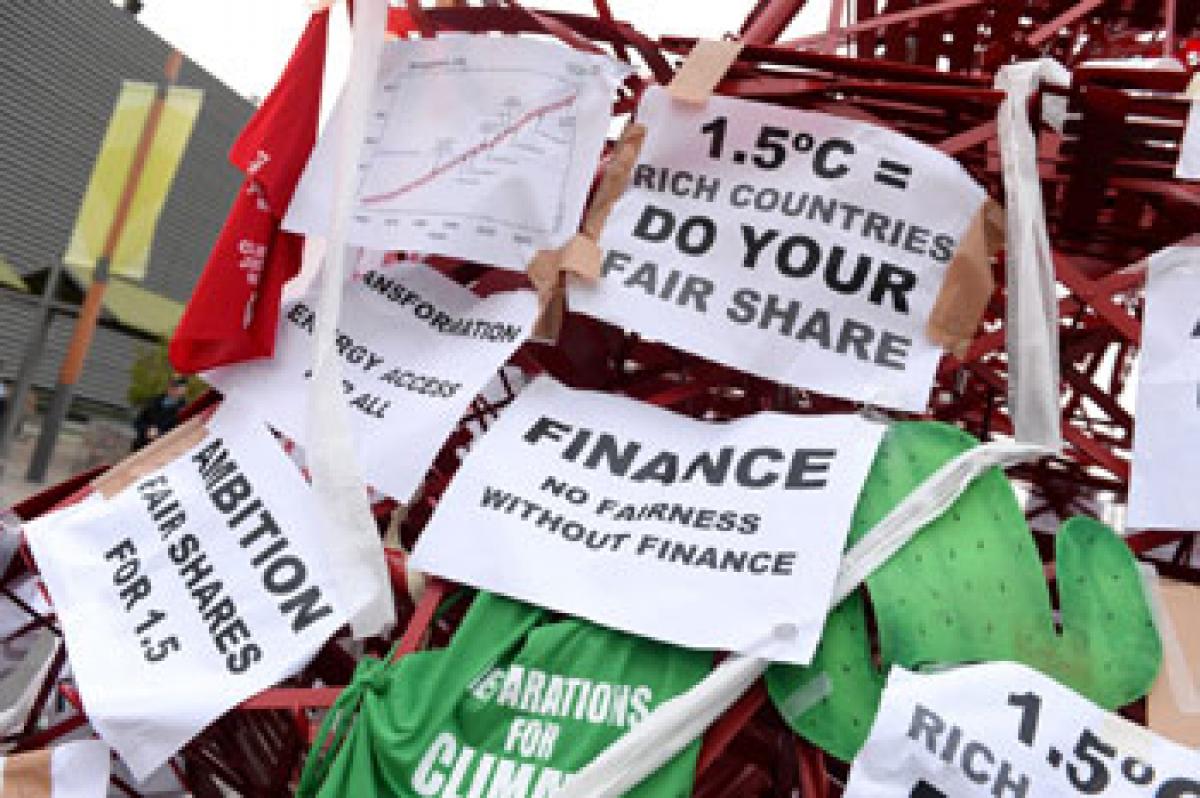Live
- CPI-M revokes suspension of Bengal party leader accused of sexual harassment
- Rachakonda Commissioner Emphasizes Health and Education at Uniform Diet Launch
- BJP leader visits late ASI Surendra Singh in Rajasthan, assures full govt support
- PM Modi tears into Gandhi family for its habit of amending Constitution
- Young Kabaddi Player Dies of Heart Attack During Match in Mandya
- Exciting Return of Santosh Trophy Football Tournament Kicks Off in Hyderabad
- Head Constable Dies by Suicide, Cites harssament by wife and inlaws
- Delhi BJP claims AAP govt will never pay women allowance like in Punjab
- India is 'Mother of Democracy': PM Modi
- ‘One nation, one election’ will undermine India’s federal structure: Mehbooba Mufti
Just In

x
Highlights
The much-awaited Paris Agreement on climate change was adopted by all members of the United Nations Framework Convention on Climate Change (UNFCCC) on Saturday.
 The much-awaited Paris Agreement on climate change was adopted by all members of the United Nations Framework Convention on Climate Change (UNFCCC) on Saturday. The Agreement will now be open for ratification by each member nation from April 2016 onwards. Some highlights from the draft text:
The much-awaited Paris Agreement on climate change was adopted by all members of the United Nations Framework Convention on Climate Change (UNFCCC) on Saturday. The Agreement will now be open for ratification by each member nation from April 2016 onwards. Some highlights from the draft text:
Achievements for developing countries
- To get the agreement under United Nations Framework Convention on Climate Change (UNFCCC); and a specific mention of the fact that this agreement will be guided by principles, including the principle of Common but Differentiated Responsibilities (CBDR) in the light of national circumstances
- The implementation of the Agreement will reflect equity and CBDR
- Enhanced support will allow for enhanced level of ambition for developing Parties
- While developed countries take absolute economy-wide emission reduction targets; developing countries will enhance mitigation efforts but are encouraged to move towards economy-wide reduction in the light of national circumstances
- Climate justice has been noted as important for some concepts
- Recognition of the need for sustainable lifestyles and sustainable patterns of consumption and production with developed countries Parties taking the lead to address climate change
- There is differentiation in finance – developed country Parties are required to provide financial resources to assist developing country Parties for mitigation and adaptation
- Global stocktake will be done in light of equity and the best available science Mitigation, review and reporting get rid of ‘differentiation’
- There is no difference now between Parties that are required to undertake and communicate ambitious action; the efforts of all Parties will represent a progression over time.
- All Parties have to report Intended Nationally Determined Contributions or INDCs every five years
- There is no differentiation in reporting, inventory of greenhouse gases and progress made in implementation of INDCs (only words of flexibility provided but not defined).
- There is no differentiation in the measuring, reporting and verification (MRV) provision. It is universal and exists in the form of a technical expert review on reporting and progress. Only says that for all it will be facilitative, non-punitive and respectful of national sovereignty
- The stocktake is universal – for aggregate actions – and will happen in 2023 and every five years henceforth.
- Finance Developed countries shall provide funds for mitigation and adaptation – but the floor of US $100 billion has been removed from the Agreement. It still exists in the decision.
- Other parties are encouraged to provide such support voluntarily Loss and Damage
- A mechanism is established but the decision says this will not involve or provide basis for compensation or liability Trading mechanism created
- Market mechanism is established and this is worse because now we have legal commitment to reduce emissions (through INDCs) and a commitment to enhance actions. Now with trading mechanism, developed countries will be allowed to buy cheap emission reduction options, which leaves the developing countries with even less options to reduce. So, we are taking on double work – we reduce to account for our INDC and we reduce to meet their obligations under their INDC.
Ambition and carbon budget
- There will be ratcheting up without principle of fair use of carbon budget established. As per the decisions:
- In 2018, an Intergovernmental Panel on Climate Change (IPCC) report on 1.5 degrees Celsius will be done, which will clearly establish the need for more ambitious action
- In 2018, a facilitative dialogue will review collective
- In 2020, there will be huge pressure on us to revise our INDCs
- Then as the text says, by 2025, massive enhancement of ambition will be required – this recognises that the carbon budget will be exhausted
- By 2025, no differentiation will exist as actions of developed and developing countries will have to be enhanced, given the need to keep the world below 1.5 degree Celsius
- In 2020 and then again in 2025, all countries will be required to revise and update INDCs based on this new science. By then, the global carbon budget would have been appropriated
Without a clear reference to the carbon budget, the actions to progressively enhance ambition will fall on all countries and could shift the burden to developing countries (Courtesy: Down To Earth; http://www.downtoearth.org.in/news/paris-climate-deal-hits-and-misses-52132)
By Sunita Narain

Next Story
More Stories
ADVERTISEMENT
© 2024 Hyderabad Media House Limited/The Hans India. All rights reserved. Powered by hocalwire.com







